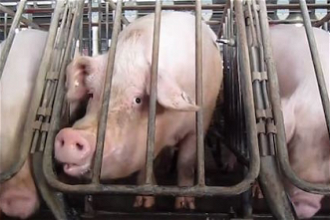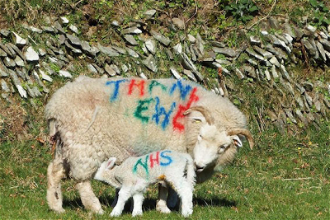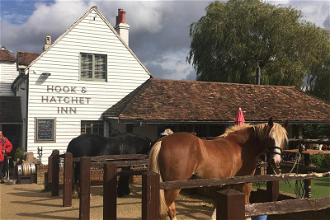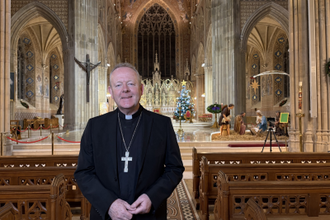Lancashire: Catholic and Rural Conference 2018
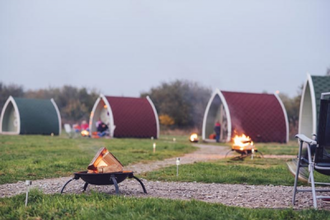
Glamping pods
The 14th Catholic and Rural conference, held at the Garstang Country Hotel and Golf Club, from 5-7 February, had a busy and varied programme.
It started of the Monday afternoon with 'A view from the farm gate,' given by Mr Colin Bradley. He left school at 15 to work on the family farm, which he has built up so it is now a major potato enterprise, processing and packing potatoes. His farm was the focus of the visit on the Tuesday.
In the evening there was a panel discussion on Brexit, where Christopher Price of the CLA, Sir Peter Kendall of AHDB, Gordon Whitford of HSBC and Lois Mansfield of Cumbria University discussed the implications of Brexit for farming and the rural community. The discussion was notable for the way the participants avoided rancour and stimulated an interesting debate. The tone may have been set by Lois Mansfield who pointed out that in agricultural terms Brexit as almost an irrelevance, distracting attention from the real problems; problems that neither the EU nor the UK governments seemed to be taking seriously. Far more important was the need to react to global warming and simultaneously increase food production to support a world population, currently at seven point six billion, that will reach nine billion within the next twenty years, and is set to peak at about eleven billion in 2100.
On Tuesday morning the conference started with Fr Rob Taylerson who discussed: "The vocation of the Agricultural Leader," a document that came about through work done by the International Catholic Rural Association. It might be summed up in the quote, "Clearly, the dominant modern approach to agriculture is in need of an ethical foundation, one that prioritises the dignity of the human person and the common good and connects farming and food to principles beyond economic metrics."
This was followed by a lecture from Duncan Thomas, describing the organisation he works for, BASC, the British Association for Shooting and Conservation. He discussed with conservation work the association does, but as an ex-policeman he also talked about the work the association does with young people drawn from inner-city areas who have no connection with the countryside or conservation and how they've managed to give people hope.
After lunch those attending the conference then went by coach to see the farm run by Colin Bradley. We looked round the processing plant, quality control, and saw potatoes being mechanically cleaned, peeled, chipped and packed. Then we saw the large biomass digester which converts all waste into methane which is burned on site to produce electricity. This is used to power the enterprise; the rest is exported to the grid. Included was a visit to the ewe-milking enterprise and the fishing lake with associated glamping pods.
One thing that impressed people was not merely the scale and efficiency of the operation, but how Colin Bradley had managed to grow not merely his business but the people working for him. So the lad who joined his company at seventeen and spent his first weeks ploughing is, some years later, managing a complex and multimillion pound biomass digester. Similarly one of his people came up with the idea of milking sheep, and so the enterprise was started as a partnership between him and Colin. The visit finished with a look at the fishing lake and glamping pods where we learned of the difficulties many rural businesses experience with planning authorities. The business, run by Colin's son-in-law, had a policy of allowing musicians a free night if they played for an hour for the entertainment of the guests. The planners demanded this be stopped because the enterprise was supposed to be a fishing lake and the musicians were obviously not fishing.
On our return to the hotel there was a talk about the auction mart from Mr John Hughes. A man with vast experience working in the marts he gave the conference an insight into the history, economics and social side of the marts. Then after Dinner there was a lecture on Laudato si from Professor Karen Kilby. Her lecture was continued next morning. By a combination of explanation and bringing those attending into the discussion, she achieved the apparently impossible, or making a papal encyclical come alive. She also used it to get those present discussing the issues in a way that means that most of us almost certainly will read Laudato si at some point and with greater understanding.
The final talk was from Rob Taylerson who looked at the rural statistics of the Catholic Church in England and Wales. He raised the issue that because of the size of many Catholic parishes, a considerable number of them might be centred on a town or even part of a city, but actually have a considerable rural hinterland. But because of the urban focus of many within the church, the needs and problems of rural Catholics and the difficulties experienced by those with a rural ministry are not understood.
This ties in nicely with the aims of the conference. One of these has always been to help Catholic clergy and laity who are working in rural areas understand the nature of rural life. It aims to give them an insight into agriculture and the industries and trades that are an integral part of the rural world.



